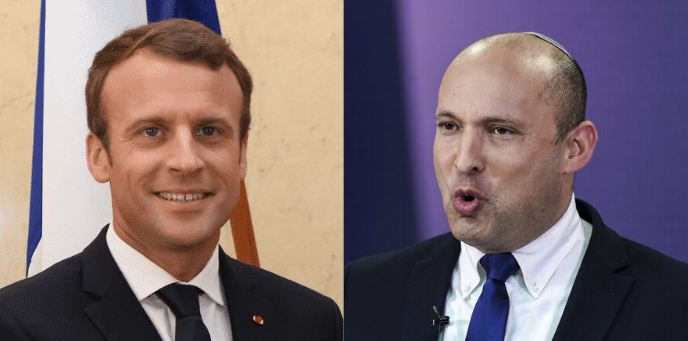Relations between France and Israel have been complex and ambivalent for decades. Owing to France’s longstanding support for the Palestinian cause, Israel has not shied away from publicly denouncing Paris’ endorsement of the two-state solution. France has for long provided Hamas with hefty donations, while Israel has regularly accused France of helping Hamas build its terror capabilities. However, considering the recent and far-consequential developments in the region, it would not be naïve to say that Israel and France are finally getting to embrace each other in their bid to beat the living daylights out of Hezbollah and Iran in Lebanon.
After being frustrated of Iran-backed Hezbollah’s brazen attempts to block the formation of the new government in Lebanon, France has now come up with a dual-pronged strategy to deal with the terrorist group. Threatening Iran with sanctions and courting Israel’s support to corner Iran in Lebanon are two aspects of France’s new strategy.
Consequently, France issued a scathing warning to Iran on Monday that it could be endangering the prospects of concluding an accord with world powers over reviving its 2015 nuclear deal. French foreign ministry spokeswoman Agnes von der Muhll told reporters that “If it continues on this path, not only will it continue to delay when an agreement to lift sanctions can be reached, but it risks jeopardising the very possibility of concluding the Vienna talks and restoring the JCPOA.”
Additionally, France is also set to welcome the Israeli defense minister Benny Gantz next week in Paris. The minister will have bilateral talks with his French counterpart over the crises in Lebanon and nuclear negotiations with Iran among others. Undoubtedly, bilateral relations between France and Israel are on a path of rejuvenation, and the major driving factor behind the resuscitation is the Iranian threat that poses grave risks to both countries.
France, for the past few weeks, has grown severely frustrated with the political deadlock that has engulfed Lebanon for the past year at the behest of Iran-backed terror organization Hezbollah. France has, by and large, led the international efforts to deal with the crisis being faced by the poverty-ridden country since last year. France has now warned Lebanese officials of the upcoming sanctions from Paris if the political deadlock is not done away with. France’s Foreign Trade Minister Franck Riester recently remarked, “France respects its promises, unlike Lebanese authorities that did not implement reforms. Things cannot continue this way.”
Of late, Israel and France have been stepping up their efforts to edify the crisis-rocked country, but without significant coordinated efforts. Now, the steadily expanding understanding of the issue can help both the countries in reconciling their efforts in solving the political and economic crisis in Lebanon.
As earlier reported by TFI , the Macron administration is seemingly pushing for a military coup in Lebanon. In past, France has usually kept clear of denouncing Hezbollah’s subversive activities in the region. However, France is now openly calling out its “terrorist activities” and focusing on mitigating Iranian support to its peace-threatening policies. On the other hand, Israel has also offered unconditional support for Lebanon, provided it accepts the same. Hezbollah is a tough nut to crack for Macron, and thus partnering with Israel is what Macron seemingly supports now.
Much to Israel’s advantage, France’s view of Israel is slowly and steadily changing for the better. As reported by Times of Israel, around 40 French parliamentarians recently visited Israel on a trip organized by a pro-Israel nonprofit organization ELNET, dedicated to strengthening the Europe-Israel relationship. During the visit, the parliamentarians acknowledged that France has changed its point of view about Israel, “but only at the top of the political class.”
The visiting parliamentarians also stated that Iran’s nuclear program and Tehran’s support for terrorism are the key factors that are prompting France to review its relations. Adding to that, during Foreign Minister Yair Lapid’s meeting with the EU Foreign Affairs Council in Brussels earlier this month, most countries supported the idea of scheduling an Association Council meeting and strengthening the bilateral relationship in general.
Read More: France ups the ante against Turkey with the Kurdistan independence group
“France is willing to explore ways to revitalize the relationship between the EU and Israel,” the French Foreign Ministry told in a statement. “This objective cannot be dissociated from the political framework in which it takes place, including EU well-known positions on the two-state solution, within the framework of international law.” During the phone call with Lapid, Frances Foreign Minister Jean-Yves Le Drian “recalled France’s strong condemnation of attacks on Israeli territory and its unwavering dedication to Israel’s security.”
France and Israel, both are robust democracies and share common values of freedom and equality. Thus, Macron is finally realizing the vast potential that a budding Israeli-French relationship offers to both countries. Macron’s gradual shift in Israel’s policy might cost him the Muslim vote bank back at home; however, his changed stance towards Israel is all set to irk Hezbollah and its sympathisers in epic proportions.








